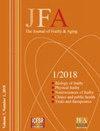COVID-19 Vaccination for Frail Older Adults in Singapore — Rapid Evidence Summary and Delphi Consensus Statements
IF 3.3
Q2 GERIATRICS & GERONTOLOGY
引用次数: 3
Abstract
This study aimed to synthesize available evidence on the effectiveness and safety of COVID-19 vaccines for frail older adults through a rapid review, supplemented with geriatricians’ consensus statements. References were identified through MEDLINE and Web of Science on 1st February 2021 using relevant terms related to COVID-19, vaccine, and older adults. Searches were also conducted on reference lists of review articles and Google Scholar. The content was updated on 8th April via hand searching. We included studies on Phase III randomized controlled trials, and data from real world administration of vaccines. A two-round Delphi study was conducted with 15 geriatricians to elicit their thoughts and recommendations regarding COVID-19 vaccination for frail older adults. Five Phase III randomized controlled efficacy trials reported vaccine efficacy ranging from 66.7% to 95% among participants aged 16 to 95. The vaccine efficacy for participants aged 65 and above is 94.7% and 86.4% for Pfizer-BioNTech and Moderna respectively. Sputnik V reported a vaccine efficacy of 91.8% for participants 60 and above. Serious adverse events were reported by 0.27% to 1% of participants who received at least one dose of the four vaccines. For the Delphi study, 16 out of 24 statements achieved consensus. The Delphi panel opined that frail or very old adults, except those with limited life expectancy, should be vaccinated due to their vulnerability. They also agree that vaccination decisions should be made by patients when possible, with the involvement of next-of-kin should the frail older adult be unable to do so. Lastly, the panel thought that frail older adults should be included in future clinical trials. In early clinical trials, there is paucity of evidence on efficacy and safety of current COVID-19 vaccines among frail older adults. Geriatricians’ consensus indicate that frail older adults should be vaccinated except where life expectancy is limited. Future trials assessing efficacy and safety should include frail older adults.新加坡体弱老年人COVID-19疫苗接种-快速证据摘要和德尔菲共识声明
本研究旨在通过快速审查,结合老年医学专家的共识声明,综合现有证据,证明COVID-19疫苗对体弱老年人的有效性和安全性。参考文献于2021年2月1日通过MEDLINE和Web of Science检索,使用与COVID-19、疫苗和老年人相关的术语。还对综述文章和谷歌Scholar的参考文献列表进行了检索。内容已于4月8日手动搜索更新。我们纳入了III期随机对照试验的研究,以及来自真实世界疫苗接种的数据。对15名老年医学专家进行了两轮德尔菲研究,以征求他们对体弱老年人COVID-19疫苗接种的想法和建议。5项III期随机对照疗效试验报告,在16岁至95岁的参与者中,疫苗的疗效从66.7%到95%不等。辉瑞- biontech和Moderna疫苗对65岁及以上参与者的有效性分别为94.7%和86.4%。据Sputnik V报道,对于60岁及以上的参与者,疫苗效力为91.8%。在接种了至少一剂四种疫苗的参与者中,有0.27%至1%的人报告了严重不良事件。对于德尔菲研究,24个陈述中有16个达成了共识。德尔菲专家组认为,体弱多病或年老体弱的成年人,除了那些预期寿命有限的人,应该接种疫苗,因为他们的脆弱性。他们还同意,疫苗接种决定应尽可能由患者做出,如果体弱的老年人无法这样做,则应由其近亲参与。最后,专家组认为,未来的临床试验应该包括体弱多病的老年人。在早期临床试验中,目前COVID-19疫苗在体弱老年人中的有效性和安全性缺乏证据。老年病学家的共识表明,体弱多病的老年人应该接种疫苗,除非预期寿命有限。未来评估疗效和安全性的试验应包括体弱多病的老年人。
本文章由计算机程序翻译,如有差异,请以英文原文为准。
求助全文
约1分钟内获得全文
求助全文
来源期刊

Journal of Frailty & Aging
GERIATRICS & GERONTOLOGY-
CiteScore
5.90
自引率
7.70%
发文量
54
期刊介绍:
The Journal of Frailty & Aging is a peer-reviewed international journal aimed at presenting articles that are related to research in the area of aging and age-related (sub)clinical conditions. In particular, the journal publishes high-quality papers describing and discussing social, biological, and clinical features underlying the onset and development of frailty in older persons. The Journal of Frailty & Aging is composed by five different sections: - Biology of frailty and aging In this section, the journal presents reports from preclinical studies and experiences focused at identifying, describing, and understanding the subclinical pathophysiological mechanisms at the basis of frailty and aging. - Physical frailty and age-related body composition modifications Studies exploring the physical and functional components of frailty are contained in this section. Moreover, since body composition plays a major role in determining physical frailty and, at the same time, represents the most evident feature of the aging process, special attention is given to studies focused on sarcopenia and obesity at older age. - Neurosciences of frailty and aging The section presents results from studies exploring the cognitive and neurological aspects of frailty and age-related conditions. In particular, papers on neurodegenerative conditions of advanced age are welcomed. - Frailty and aging in clinical practice and public health This journal’s section is devoted at presenting studies on clinical issues of frailty and age-related conditions. This multidisciplinary section particularly welcomes reports from clinicians coming from different backgrounds and specialties dealing with the heterogeneous clinical manifestations of advanced age. Moreover, this part of the journal also contains reports on frailty- and age-related social and public health issues. - Clinical trials and therapeutics This final section contains all the manuscripts presenting data on (pharmacological and non-pharmacological) interventions aimed at preventing, delaying, or treating frailty and age-related conditions.The Journal of Frailty & Aging is a quarterly publication of original papers, review articles, case reports, controversies, letters to the Editor, and book reviews. Manuscripts will be evaluated by the editorial staff and, if suitable, by expert reviewers assigned by the editors. The journal particularly welcomes papers by researchers from different backgrounds and specialities who may want to share their views and experiences on the common themes of frailty and aging.The abstracting and indexing of the Journal of Frailty & Aging is covered by MEDLINE (approval by the National Library of Medicine in February 2016).
 求助内容:
求助内容: 应助结果提醒方式:
应助结果提醒方式:


